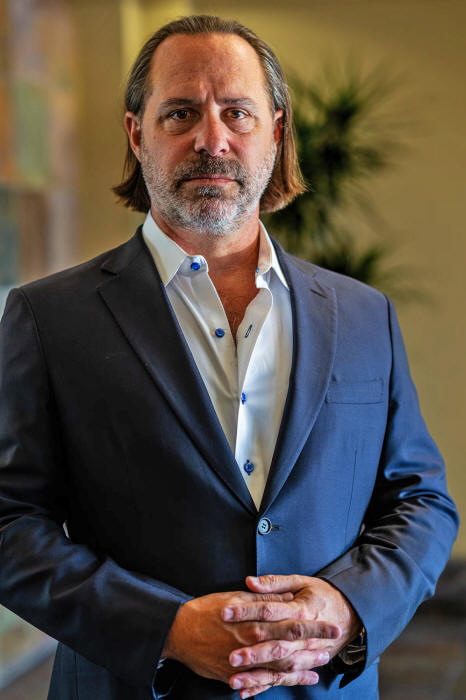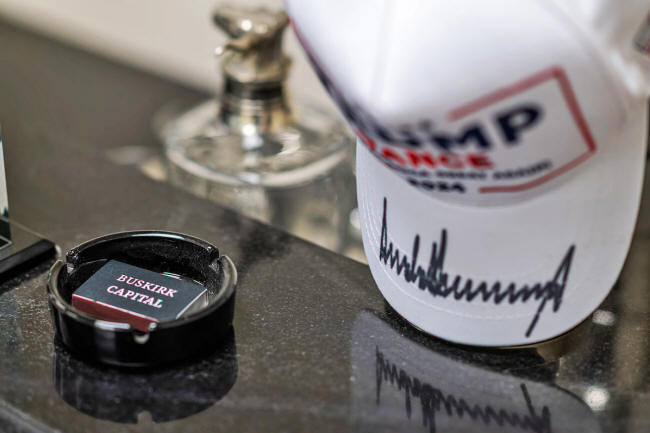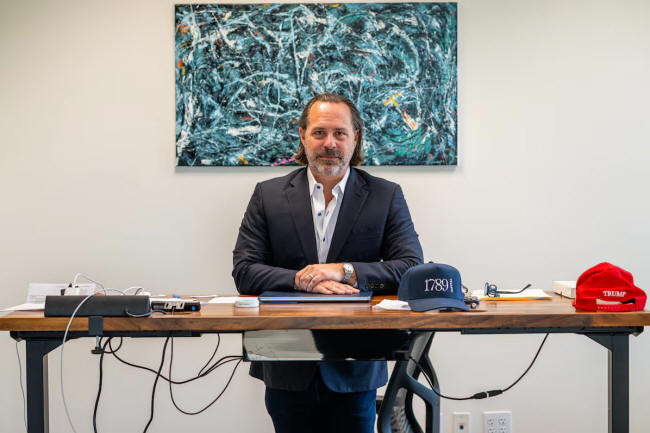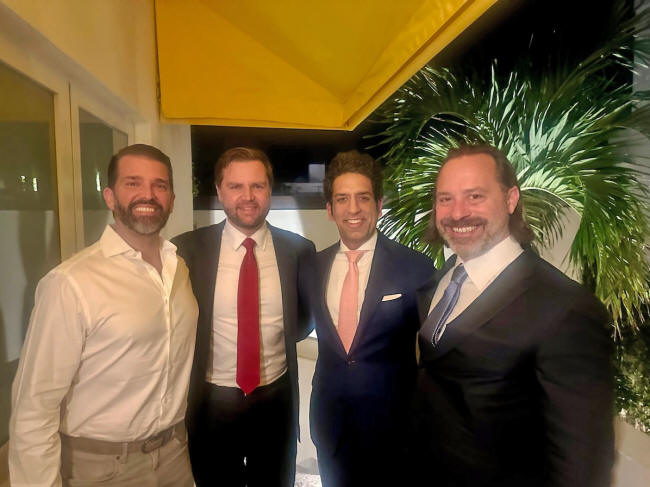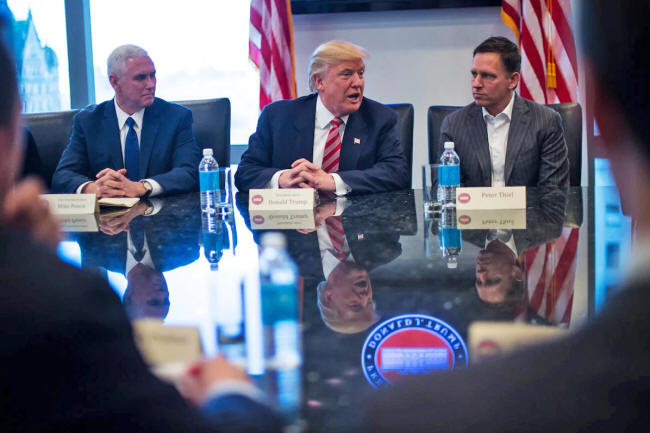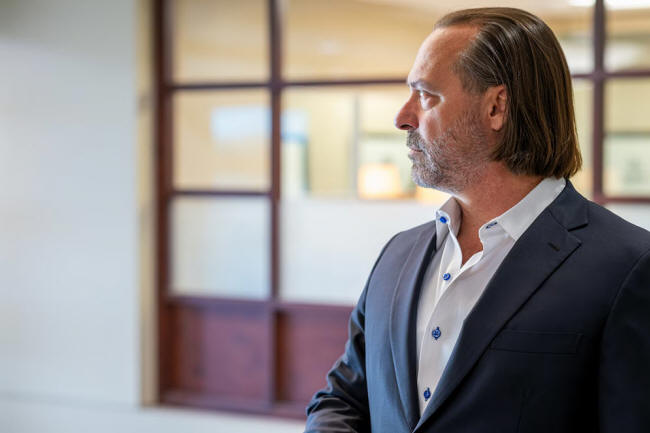|
Natalie Allison and Peter
Jamison contributed reporting
Chris Buskirk leads a coalition of business and tech donors who helped re-elect Donald Trump and are now at the center of power in Washington. (Ash Ponders/For The Washington Post)
Chris Buskirk put tech elites at the center of power in Trump's Washington. His efforts are grounded in a controversial theory: an "aristocracy" is needed to move the country forward.
In 2019, a small group of right-wing donors rented a resort outside the 100-person town of Rockbridge, Ohio, for a summit to secure the future of the MAGA movement.
They aimed to turn a singular candidate - President Donald Trump - into an enduring political coalition, with a pipeline of voters, donors and candidates that would cement a radical transformation of the GOP.
Convened by Silicon Valley billionaire Peter Thiel and JD Vance, then an investor who had written a best-selling memoir, the meeting included hedge fund heiress Rebekah Mercer, then-Fox News host Tucker Carlson and economist Oren Cass, according to two people familiar with the meeting.
The people spoke on the condition of anonymity to describe the private gathering, details of which have not been previously reported.
But the person in the room who would solidify the group's ambitions was someone with a decidedly lower profile:
Today, Buskirk helms the Rockbridge Network,
Political strategists credit the close-knit network of businessmen-cum-donors with helping fuel the president's reelection last year and propelling one of its own - Vance - into the vice presidency.
With significant funding from tech leaders, Rockbridge aims to equip MAGA to outlive Trump.
The group has no website or public-facing entity, but it has assembled pollsters, data crunchers, online advertisers and even a documentary film arm.
It is gearing up to deploy its arsenal in the 2026 midterms and in the 2028 presidential contest, in which many Rockbridge members hope Vance will be the nominee.
The group has assembled a database with
deep profiles of potential voters through nonpolitical memberships,
including outdoors groups and churches, according to a person
directly familiar with the organization.
Buskirk's ties to Trump's orbit go beyond Rockbridge.
1789 Capital, the venture capital firm he co-founded with investor Omeed Malik, focuses on what the partners call "patriotic capitalism" and now counts Donald Trump Jr. as a partner.
The pair - along with administration officials and friends - recently launched Executive Branch, a $500,000-a-head membership club for Trump-supporting business leaders to hobnob in D.C.
The secretive donor circle that lifted JD Vance is now rewriting MAGA's future © Ash Ponders/For The Washington Post
These organizations have a collective ambition, according to Buskirk, which is to give the businesspeople he sees as vital to the country's future a role shaping government and lasting political power.
Their efforts are grounded in a controversial theory of social progress:
Putting industry leaders in positions of power is a hallmark of Trump's presidency - from Commerce Secretary Howard Lutnick to tech titan Elon Musk - and Buskirk says the MAGA movement has energized a new generation of stewards for the country.
His various projects echo what some on the right call "aristopopulism" and aim to build a bridge between wealthy capitalists and the working-class people they intend to represent, according to interviews with Buskirk and nine other people in his inner circle, profitably reindustrializing the country and tying their interests to that of their base.
Many innovative periods in history have been driven by such an aristocracy, Buskirk argues, a point he makes in his 2023 book, "America and the Art of the Possible."
As Buskirk sees it, he has approached the political market as a businessman, identifying a gap and taking deliberate steps to close it.
The right had what he calls a "coordination problem" - voters who had unexpectedly elected Trump and a nascent group of wealthy people who had become alienated by the progressive left.
But the sides lacked organizing infrastructure.
Buskirk uses a one-liner to describe his efforts:
Others describe his impact more forcefully.
Though people still see Trump's support as "a cult of personality," said Cass, chief economist of the conservative think tank American Compass, a powerful ecosystem now backs the MAGA movement.
Chris Buskirk is a co-founder of the Rockbridge Network and 1789 Capital. © Ash Ponders/ For The Washington Post
He declined to comment on Rockbridge's founding event. Thiel declined to comment. Mercer did not respond to a request for comment.
Relatively unknown outside his rarefied circle of business leaders and tacticians, Buskirk is an unusual figure to step into a role once dominated by the Koch brothers, the deep-pocketed Republican megadonors who have opposed many of Trump's trade policies.
He is not a meme-throwing MAGA firebrand; friends describe Buskirk as a dogged tactician who is fiercely perceptive.
He was "the first mover" to recognize that there were going to be thousands of well-off people who,
Vance told The Post in a statement that Buskirk is an,
Outside of electoral politics, Buskirk's projects aim to push unrestrained capitalism into American life.
1789 Capital, he says, serves as a testing ground for the idea that homegrown innovation can revive America's industrial base, what the firm's partners pitch on their website as,
The firm, which has invested in roughly 30 companies, has funded start-ups tied to "anti-woke" politics and to the Trump administration's economic agenda, including companies that mine rare earth minerals, build AI factories for war or 3D-print rocket fuel.
As Buskirk's network has become entwined with the Trump administration, the cohort has formed a party circuit for Washington's new power broker class.
Rockbridge's semiannual conference, at the Ritz-Carlton on Key Biscayne, Florida, in April, which featured Make America Healthy Again-themed breath work and yoga sessions, included Treasury Secretary Scott Bessent, Director of National Intelligence Tulsi Gabbard and Middle East special envoy Steve Witkoff.
Buskirk's friend, Health and Human Services Secretary Robert F. Kennedy Jr., attended the opening of Executive Branch in June, which serves high-end wine and sushi but no seed oils.
From left, Donald Trump Jr., JD Vance, Omeed Malik and Chris Buskirk convene in Palm Beach days before Trump's second inauguration. © Obtained by The Post/ Obtained by The Post
Those in Buskirk's network view their growing clout as evidence of government finally working to cheerlead rather than chastise society's innovators - unleashing a pent-up economic engine that they say was suppressed during the Biden administration.
Yet in entities like Rockbridge and 1789, some critics see something more pernicious:
Since coming into office, the Trump White House has rolled out a raft of new policies that benefit tech entrepreneurs, including lifting export controls on AI technology and signing executive orders and legislation promoting cryptocurrency.
Since Trump Jr. joined 1789 as a partner last November, the firm has raised hundreds of millions of dollars and now has more than $1 billion in assets, according to two people familiar with the firm.
This summer the government dropped two Biden-era federal investigations into Polymarket, a blockchain-based betting start-up that 1789 has invested in and where Trump Jr. now sits on an advisory board.
To Buskirk, these critiques miss the point.
He says he is determined to bring the businesspeople that put Trump back in the White House to Washington, even if he doesn't much like the city.
He describes politics as "venal" and D.C. think tanks as "every cliché, squared," saying the culture must be rebuilt from the ground up.
'A Coordination Problem'
Ask Buskirk to rattle off where he is on any given day, and the 56-year-old father of four might name seven different cities.
He splits his time between his Scottsdale family office; Palm Beach, Florida, where 1789 Capital is headquartered; Dallas; San Francisco; Austin; and, reluctantly, D.C.
He says he is on the phone from the moment he wakes up until bedtime, always making time for Vance when the vice president's schedule allows.
But Buskirk's early life was spent almost entirely in Arizona.
Though he was born on a military base in Germany, where his father was stationed in the Army during the Cold War, he grew up in Scottsdale.
He spent weekends working at the family company, which insured homes and small businesses across the state.
The household was "patriotic to the nth degree," Buskirk recalls, and they were stalwart subscribers to the conservative magazine the National Review.
As a young adult, Buskirk pursued a master's degree in political theory and interned at the Claremont Institute, the right-wing think tank inspired by the political philosopher Leo Strauss.
But he quit both the think tank and the degree, judging academia too impractical.
He returned home to Scottsdale to start an insurance firm, doing underwriting for ambulance vendors and other unconventional businesses. Over the next two decades, he built and sold four other insurance-related companies.
His family had become alienated from politics.
The Buskirks canceled their National Review subscriptions in the mid-2000s, disgusted by a Republican establishment they believed had led the country astray.
The Iraq War had become "a smoke screen," Buskirk said, distracting from the stark economic problems emerging before his eyes.
Some of the decor at Buskirk Capital in Scottsdale, Arizona. © Ash Ponders/ For The Washington Post
Visiting close family in Michigan, he watched as entire,
...after the country joined the World Trade Organization in 2001, he said.
Americans, he said, were going to work in low-paying service jobs:
Then illegal immigrants came and took those jobs too, he said.
He raged to friends that the American Dream,
When President Barack Obama came on the scene in the late aughts (2000s), Buskirk watched as he electrified the culture.
During those years, Buskirk had sold off the last of the insurance businesses he had built with his father.
By the time Trump came down the golden escalator at Trump Tower to announce his presidential candidacy in 2015, Buskirk had more time on his hands. The Arizona entrepreneur was initially skeptical of the New York reality show host who he worried viewed the presidency as a publicity stunt.
But when he watched old interviews with Trump, he heard a drumbeat about how American leaders were not putting Americans first.
In July 2016, Buskirk founded an online magazine, American Greatness, which highlighted an "undeniable" need for a new articulation of conservatism.
It received funding from Thiel, who had shocked liberal Silicon Valley with his million-dollar donation to Trump and had recently been introduced to Buskirk by a friend.
Thiel put Buskirk in touch with his protégé, "Hillbilly Elegy" author Vance.
Vance and Buskirk became fast friends.
The men spent a year and a half "just nerding out," with no particular end in mind, Buskirk recalls, just a feeling that,
Vice President-elect Mike Pence, left, and PayPal founder Peter Thiel listen to President-elect Donald Trump during a meeting with technology industry leaders at Trump Tower in New York in 2016. © Jabin Botsford/ The Washington Post
In 2019, Vance and Thiel summoned a dozen or so people to an inn in rural Ohio, located just outside the tiny town that would become the organization's namesake.
Some attendees were staunchly pro-Trump, like Buskirk. Others had their doubts.
But all of them felt that any successes that took place during the Trump years could easily become a fluke if a Democrat retook the White House, said Blake Masters, an investor who met Buskirk that weekend.
It became to clear to some of those present that MAGA had a network problem.
While donors on the right, such as the Kochs, had spent years building their organizations, wealthy people who supported Trump and the emerging constellation of right-wing viewpoints he represented "didn't really know each other," Buskirk said.
And people who had voted for Trump - including a working-class cohort - weren't organized either.
The Making of a Movement
Buskirk returned from the summit energized, and he became a student of political organizing.
He started from first principles, reading "Roots to Power," an influential left-wing organizing manual from the '80s.
Along with Vance, he began creating case studies of political organizations on the left and right, documenting their failures and successes.
The National Rifle Association stood out.
The NRA, Buskirk and his partners concluded, had been very successful at organizing one of its two constituencies:
But its other constituency, outdoorsmen who loved hunting, was not as well organized, and they were unlikely to register to vote.
But outdoorsmen, a Democratic coalition from the '60s, had significant overlap with demographics that voted for Trump.
Chris Buskirk took it upon himself to become a student of political organizing. © Ash Ponders/ For The Washington Post
Buskirk will not go into many details about Rockbridge operations, but he says that on a high level he devised a classic online sales funnel to entice people to join social media groups based on affiliations.
This included small-business owners, outdoorsmen and church attendees.
This is the opposite of how political organizations tend to function, persuading people to come to your side by "brute force," Buskirk said, blasting out ads right before an election.
Rockbridge, by contrast, took a more gradual approach:
By April 2022, Vance was making his first, long-shot bid for political office.
Malik hosted a small fundraiser for him at a restaurant in Palm Beach. The investor had relocated from New York City the previous year, after defecting from the Democratic Party over coronavirus restrictions and tech platforms' policing of speech about the coronavirus.
Buskirk attended, along with Don Jr.
The group hopped over to Mar-a-Lago, where Buskirk was throwing a Rockbridge conference.
The men spent the week bonding over their rage about what they viewed as online censorship and a feeling that innovation was being stymied in favor of liberal priorities such as sustainability and diversity initiatives.
Malik and Buskirk went into business together the following year, starting 1789 Capital, named after the year the Bill of Rights was proposed.
It initially focused on what Malik had dubbed "anti-woke companies."
Their first investment was in Last Country Inc., a new media and entertainment company founded by Tucker Carlson, who had been pushed out of Fox News.
The partners went on to invest in,
(The partners have also taken positions in three of Elon Musk's companies: SpaceX, Neuralink and xAI.)
Will Edwards, whose Dallas-based start-up Firehawk Aerospace specializes in 3D-printing solid rocket fuel to be used in missiles, said many Silicon Valley venture capitalists had rejected his pitches outright because they didn't want to fund companies selling exclusively to the military.
Buskirk, who has since led a funding round that put $60 million into Firehawk, took a particular interest, traveling to Dallas to tour Edwards's factory, where, he said, workers without college degrees can make six-figure incomes.
Buskirk believes Edwards's company is economic proof of the investors' political arguments: The U.S. is unlikely to make iPhones and Nike shoes again, he says. But it can revive its industrial base - particularly in national defense - and help restore the middle class.
This goal is one President Joe Biden also tried to accomplish when he signed the $52 billion CHIPS Act in 2022, which aimed to re-shore advanced manufacturing jobs with the largest support package for domestic chips manufacturing in a generation.
Trump has criticized the grants as wasteful and clawed back some of the funds. Strain, the American Enterprise Institute economist, said the political rhetoric of the MAGA movement misconstrues the nation's actual economic picture.
Technological innovation - and not outsourcing - has been the main driver of the loss of manufacturing jobs, he said, adding that many of those arguing that homegrown manufacturing will revive America are the same investors pushing major labor displacement through artificial intelligence.
Cass, of American Compass, said the scale of investment required to rebuild working-class communities is far greater than what 1789 or other like-minded investors can spend.
But the experiments Buskirk and his partners are funding are important, he said, because they "blaze a trail."
The impact of Rockbridge and super PACs on the 2024 election is not well understood.
Turnout for America spent $34.5 million on the 2024 cycle, according to FEC records, far less than the $261 million from Elon Musk's AmericaPAC.
But internal Rockbridge data suggests some measure of effectiveness, which insiders attribute to its years-long voter profiling and mobilization efforts.
The super PAC identified several million citizens - low-propensity voters in seven swing states - that they believed would vote for Trump if nudged to go to the polls. The group calculated that Trump would win those states if they could motivate 40 percent of those voters to go to the polls.
In the end, Rockbridge's 3,000 canvassers turned out 50 percent, said two people with direct knowledge of internal stats.
Today, the group's vibe is euphoric. Interest has surged since the election, according to Buskirk, with roughly half of new members coming from the tech industry.
Several of the group's members are billionaires; prominent investors Marc Andreessen and David Sacks are already members.
Still, Firehawk founder Edwards, who joined Rockbridge with an invitation from Buskirk, said the events feel warm,
Edwards said he lives in a duplex and drives a Toyota. A wide age range is represented, including NextGen, an under-30 division that includes Buskirk's son, Chris, a recent college graduate.
Richard Painter, a corporate law professor at the University of Minnesota who served as chief ethics lawyer in the Bush White House, said this influx of interest in Rockbridge, 1789 and Executive Branch creates the appearance of a "pay to play" network, of people who are paying to get access to administration officials or the Trump family.
(He also said he would have advised administration officials not to attend these gatherings if they happened in his time.)
Buskirk declined to address this criticism.
In a text message sent while overseas on business, he said that American greatness will only be accomplished,
His book lists historical moments when elite networks moved society forward, including,
Parallels to remarkably innovative historical periods were starting to happen, he said, but,
|


